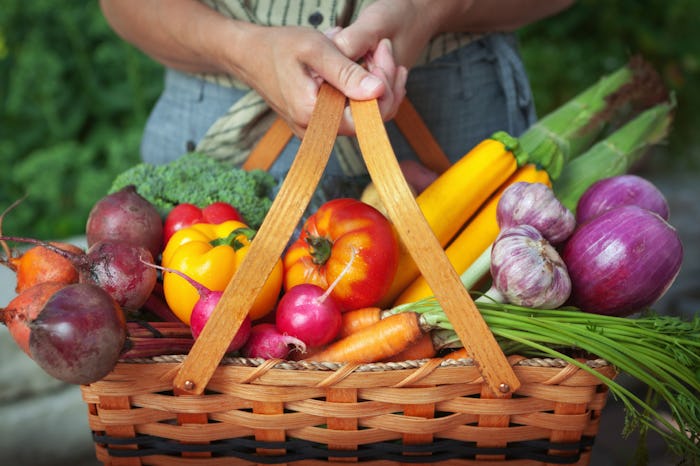Life

9 Surprising Foods Dietitians Refuse To Eat, Because Sugary Sodas Aren’t The Only Thing They Pass
These days, thanks to the technological powers that be, nutrition education is more accessible than ever — with healthy cooking web shows, food documentaries on Netflix, and smart nutrition podcasts at the click of a button. The information is out there, whether it’s nutrient-packed superfoods you absolutely should be eating (starting tomorrow) or the dire consequences of one too many fast-food lines (when you can avoid them).
But the endless recommendations and guidelines can be hard for any one person to sift through. When it comes down to it, what do dietitians refuse to eat? Which foods do the experts deem too risky to put in their bodies — not just in moderation, but at all?
This kind of information wasn’t available when I was a kid. My parents couldn’t Google food ingredients or contact dietitians via their blogs. They couldn’t click over to YouTube and watch nutritional experts share the latest and greatest science behind gut microbes and amino acids, or learn about the sneaky health busters lurking in grocery stores. They couldn’t send an email saying, “Hey Ms. Nutritionist, with all of your schooling and expertise, what does your daily diet look like?”
And so I reached out to leading nutrition experts for their biggest “no no” foods beyond the standard candy and chips and artificial sweeteners. What do they avoid at all costs, under any circumstances — because they know better?
1“Wheat” Bread
“The first thing that comes to mind is ‘wheat’ breads that usually contain coloring agents and high fructose corn syrup in the ingredient list,” Jessica Jones and Wendy Lopez, the registered dietitians behind Food Heaven Made Easy, say of their off-limit foods. Although wheat bread has a healthy reputation, some brands — even some labeled 100-Percent Whole Grain” — could actually be processed as less-nutritious, stripped-down white flour, and be filled with dough conditioners and flavorings. (Manufacturers will then add germ and bran back in, allowing them to label it as “whole wheat.”) Instead, Jones and Lopez suggest consuming grains — including bread, cereal, oatmeal, and pasta — that have at least 3 grams of fiber per serving, and no more than 6 grams of sugar.
2 Orange Juice
Jones and Lopez are also quick to avoid orange juice — freshly squeezed or not. “It’s always better to eat the fruit first, as OJ is typically loaded with sugar, and the fiber content is slim to none,” says the dietician duo, who both hold Master’s Degrees in Nutrition Science.
3Skim Milk
“Call me old-fashioned, but I think Mother Nature packages fat-soluble vitamins like vitamin A and D with fat for a reason,” says Susan Sampson, a holistic nutrition consultant and chef instructor at The Art Institute of Washington. Sampson says studies show people do not gain weight from whole milk, but they do from skim milk.
4Margarine
“You’ll never catch me eating margarine,” Claire Willis, Director of Culinary Nutritionists at MenuTrinfo told Bustle.com. “The partially hydrogenated oils (a.k.a. artificial trans fats) in margarine have been linked to heart disease, so I like to choose heart-healthy olive oil, or even butter, which touts a better nutritional profile.”
5 Reduced-Fat Peanut Butter
“When foods promise flavor without the fat, that falls into the category of what I like to call ‘foods that don’t make sense,’” Kristin Kirkpatrick, a registered dietitian and wellness manager at the Cleveland Clinic Wellness Institute told YouBeauty. “When manufacturers remove the fat from peanut butter, they simply reduce the overall amount of peanuts — the healthy fat source — and replace it with sugar.” When it comes to PB, Kirkpatrick noted that it should have one ingredient: peanuts.
6Fiber Bars
Kirkpatrick also avoids fiber bars, calling them, “a candy bar in disguise.” While she’s all for fiber — and suggested aiming for 25 to 35 grams per day — there are plenty of whole-food sources for fiber without the added sugar, like whole grains, vegetables, nuts, and legumes.
7Bacon
Don’t expect to see Keri Gans order a side of bacon at breakfast. The dietitian and author of The Small Change Diet told Women’s Health she hasn’t eaten the stuff since she was a kid — and for good reason. “Its high saturated fat and sodium content has been a huge deterrent for me for years.”
Gans isn’t the only nutrition expert who doesn’t eat bacon. Bonnie Taub-Dix, nutritionist author of Read It Before You Eat It, told Everyday Health she would “never eat processed meats” like bacon, sausage, and hot dogs, because of the added risk for cancer, cardiovascular disease, and even death, and the extreme sodium levels.
8Energy Drinks
No matter how tired she may be, dietitian Bethany Wheeler, will never resort to energy drinks. “Energy drinks tend to have an excessive amount of caffeine, which have have potentially life-threatening side effects,” she told Bustle.com. But there is an added danger to these quick caffeine fixes. “Energy drinks are technically supplements and are not regulated in the United States, which means there is no way of knowing what exactly are in them.” Best to be wary of next time you reach for a can.
9Anything With Ingredients You Can’t Pronounce
If you can’t pronounce it, you shouldn’t eat it. That’s the simple, sane advice Sampson gives her clients. “I avoid processed foods with long lists of ingredients, with type too small to read, and ingredients I cannot pronounce, let alone know what they look like.” Instead, Sampson suggests eating real, whole foods that don’t require nutrition facts labels at all.
Images: Take Back Your Health Conference, Stacy Spensley, Rob Bertholf, Benjamin Horn, Matthew Paul Argall, Denise Krebs, Shoshanah, cookbookman17, Guudmorning!, Christian Cable/Flickr